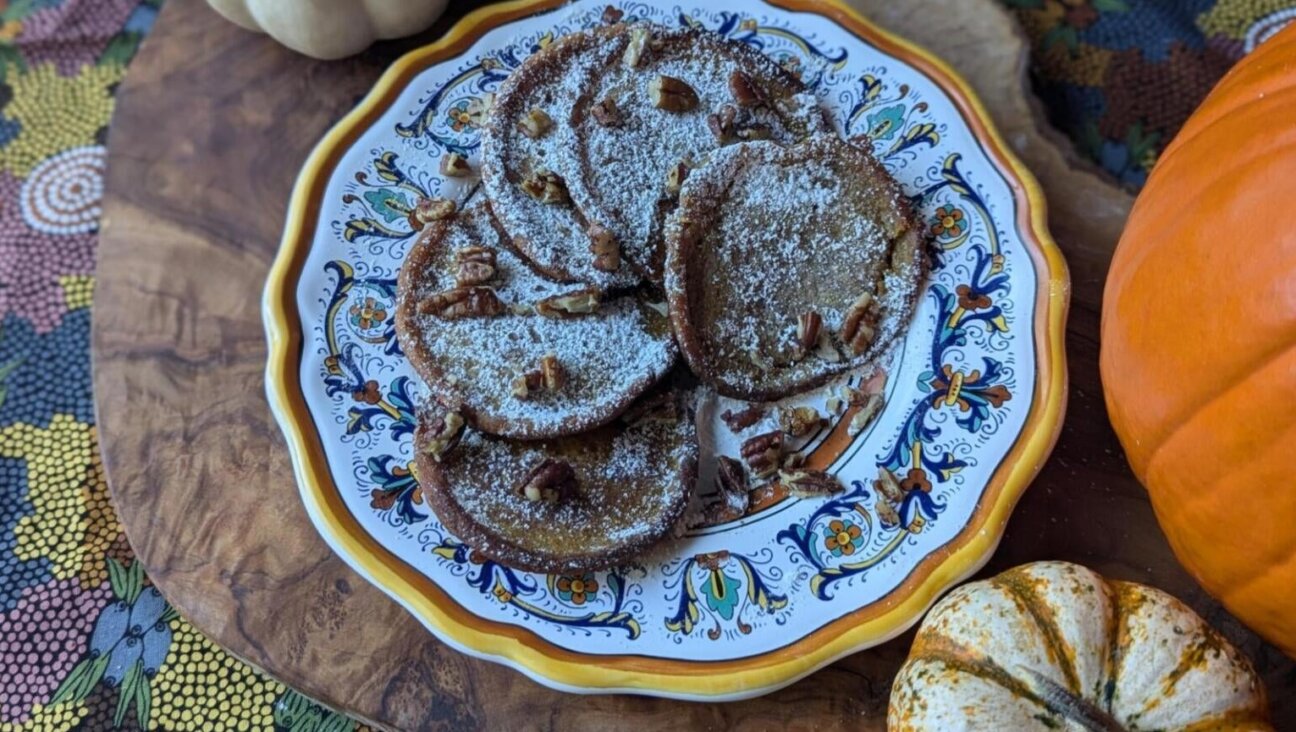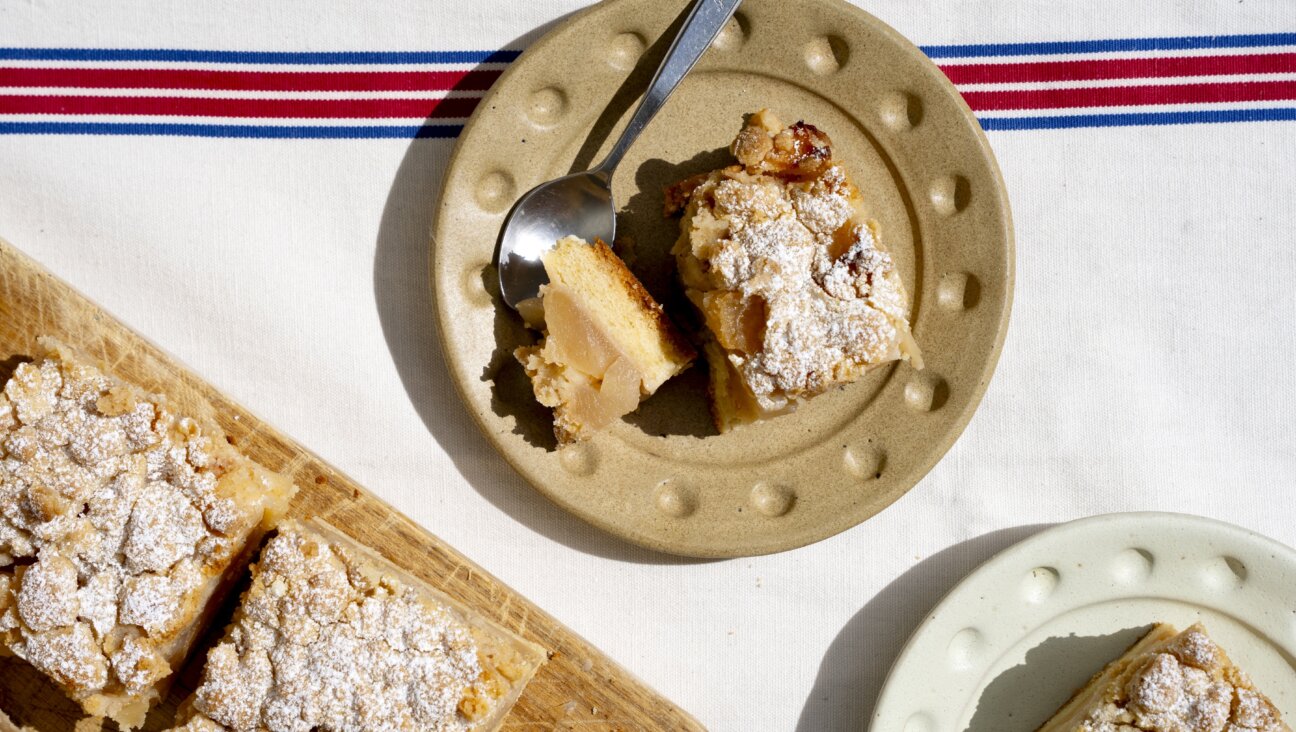Falafel and gnocchi recipes via slideshow nurture my daughter long-distance

Graphic by Angelie Zaslavsky

Sweet Potato Gnocchi Image by Getty Images
I’m in quarantine in Massachusetts. My daughter, 21, is locked down in London. I have nourished her though illness, grief, anxiety over exams, boys and college essays. She’s had little distress in her life that hasn’t been soothed by shakshuka, sweet potatoes, or scrambled eggs and smoked salmon. But now, when her need for comfort food is most acute, I can’t provide it. We’re both starved—she of the spiritual sustenance she gets from foods laced with love, and I of the chance to nurture my girl, to hand a meal hot from the stove to a child who needs warming.
But I’m not just a mother. I’m a Jewish mother, and so by definition unwilling—constitutionally unable—to bemoan this and be done.
So I compiled a series of slideshows showing my daughter how to prepare the things she’s been craving through this crisis. First up are Sweet Potato Gnocchi and Sweet Potato Falafel. The first is a wholesome take on a comfort classic. The Sweet Potato Falafel that follows is reminiscent for us both of the kiosks in Paris and Tel Aviv where we enjoyed pita pockets stuffed with conventional falafel – in a world that seems very, very far away.
Sweet Potato Gnocchi
1 medium/large sweet potato (roughly 1 pound )
1 egg yolk
1 cup bread or pasta flour, plus extra for dusting down your hands and the work surface
Salt
For serving:
Tomato Sauce
Grated Parmesan or crumbled feta cheese.
Instructions:
Bake Your Sweet Potato.
Scoop out the potato and mash is thoroughly. Get it as smooth as possible—no lumps at all.
Let it cool completely. If you start adding flour while the potato is warm, it will absorb too much, and the dough will be gummy.
Once the potato is totally chilled, add the egg yolk and mash again, thoroughly.
Now start adding the flour, 1/4 cup at a time, until you have a stiff dough. Chill in the refrigerator for about 30 minutes.
Make your tomato sauce, and keep it simmering on the stove while you proceed with the gnocchi.
1 tablespoon olive oil
1 medium onion, chopped
2 garlic cloves, crushed and minced
Splash of balsamic vinegar
2 cups chopped tomatoes
2 tablespoons minced fresh parsley or basil
Heat the olive oil in a saucepan or skillet.
Add the onion and saute over low heat, stirring until limp. Add the garlic and stir only until thethe aroma rises and it’s well blended with the onion and taking care not to let it burn (as Mum commonly does) Toss in a small slug of balsamic vinegar and str until it nearly evaporate, less than a minute. Add the tomatoes, stir well and let simmer until the flavors meld, 10-15 minutes. If the thickens, stir in ¼ cup of water and continue to simmer. Stir in the parsley or basil and add salt and pepper to taste.
Salt and freshly ground black pepper to taste.
Now get everything ready to work swiftly through the next phase: Lightly flour your work surface and bring a large pot of water to a boil. Toss some salt into the water.
Have a very sharp paring knife handy, a slotted spoon and a large bowl for transferring the sauce and gnocchi once they’re cooked.
Take the dough out of the refrigerator and put about 1/4 of it onto the floured work surface. Flour your hands a bit and roll the dough into a rope, making it as thick or thin as you like, depending whether you want gnoccetti or gnocchzilla.
Now use your sharp knife to cut them into pillow-shaped gnocchi, and plop them into the boiling water while you prepare the next batch. By the time you finish rolling out and cutting the second batch, the first should have risen to the surface of the boiling water. If not, stir gently with the slotted spoon until they float up. Let the simmer on the surface for a few seconds, then scoop out with the slotted spoon and put into the large bowl. Pour a bit of the sauce onto and stir to keep the gnocchi form sticking together. Continue rolling and cutting and boiling until you’re done, remembering that the gnocchi have cooked when they’ve risen to the surface. Keep adding sauce to the bowl to ensure they don’t stick, adding more for serving, is you want the gnocchi to be as saucy as you are. Crumble feta ontop, or sprinkle with parmesan.
Baked Sweet Potato Falafel
1 medium /large or two small sweet potatoes (orange inside), around 700g or 1 1/2 pounds in total
11/2 teaspoons ground cumin
1 ½ tsp ground coriander
1 tsp sweet paprika
¼ cup finely chopped onion
2 small cloves of garlic crushed and minced
¼ cup fresh cilantro/coriander, chopped
Juice of half a lemon
1 ½ -2 cups (120g) chickpea flour
salt and pepper
Topping
2 tablespoons tahini
¼ cup warm water
Juice of half a lemon
Instructions:
Preheat the oven to 425F degrees (220C) and roast the sweet potatoes whole until just tender – 45 minutes to 1 hour. Turn off the oven, leave the potatoes to cool, then peel.
Put the sweet potatoes, cumin, minced onion, garlic, ground and fresh coriander, lemon juice and gram/chickpea flour into a large bowl. Add everything but the chickpea flour and the ingredients for the topping, and mash until smooth and well combined. Add the chickpea flour and mash again until it’s well incorporated. Cover the bowl and refrigerate for an hour or more, until it’s firm to the touch.
Reheat the oven to 400F/200C. Scoop out portions in ½ cup amounts, onto a baking tray, about 1 inch apart. Bake until golden brown, about 15 minutes. If still soft in the center, turn each over and bake for an additional 5-10 minutes.
Meanwhile, make the topping:
Put the tahini in a small bowl. Add the hot water and stir until it’s thickened and smooth. Add the lemon juice and as much additional water—a drop at a time—until it’s thick and spreadable. Season with salt to taste.
Serve stuffed into pita and topped with the sauce, or simply with sauce and fresh greens. Makes about 18 falafel, enough for 4 – 6.

















